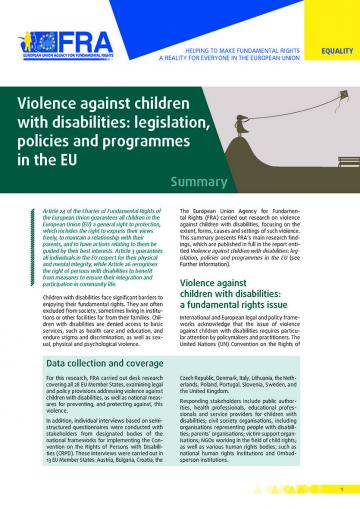Help us make the FRA website better for you!
Take part in a one-to-one session and help us improve the FRA website. It will take about 30 minutes of your time.

2
December
2015
Violence against children with disabilities: legislation, policies and programmes in the EU - Summary
Children with disabilities face significant barriers to enjoying their fundamental rights. They are often excluded from society, sometimes living in facilities far from their families. They are also denied access to basic services, such as health care and education, and endure stigma and discrimination, as well as sexual, physical and psychological violence. This summary report outlines relevant international and European standards and reviews national legislation and policies addressing violence against children with disabilities. The summary also explores the extent and different causes, settings and forms of such violence, and presents measures and initiatives to prevent it.
Downloads
01 December 2015
Język
Bulgarian
Język
Croatian
Język
Czech
Język
Danish
Język
Dutch
Język
English
Język
Estonian
Język
Finnish
Język
French
Język
German
Język
Greek
Język
Hungarian
Język
Irish
Język
Italian
Język
Latvian
Język
Lithuanian
Język
Maltese
Język
Polish
Język
Portuguese
Język
Romanian
Język
Slovak
Język
Slovenian
Język
Spanish
Język
Swedish
International, European and national law all recognise the right to protection from all forms of violence. But even though protective measures are available, girls and boys with disabilities are more likely than their peers to experience violence, sexual abuse or bullying in schools, at home or in institutions across the European Union; they also often face violence linked to their disability.
FRA scrutinised the important but underreported issue of violence against children with disabilities, carrying out desk research and conducting interviews with knowledgeable stakeholders. This report presents the results of that research.